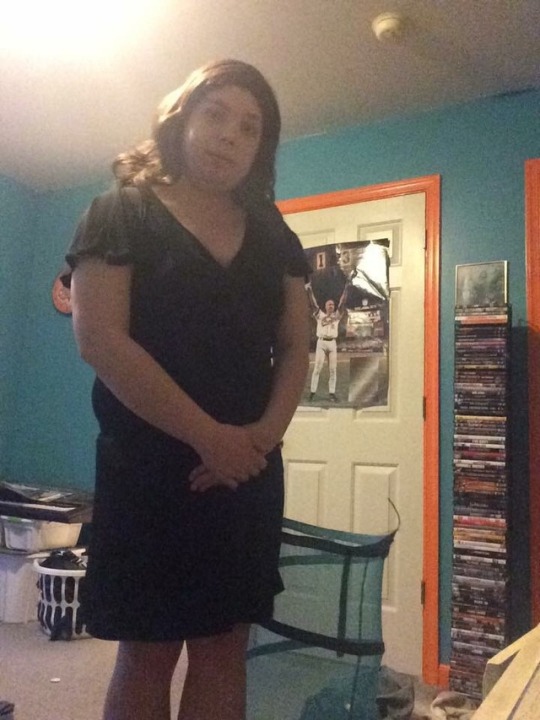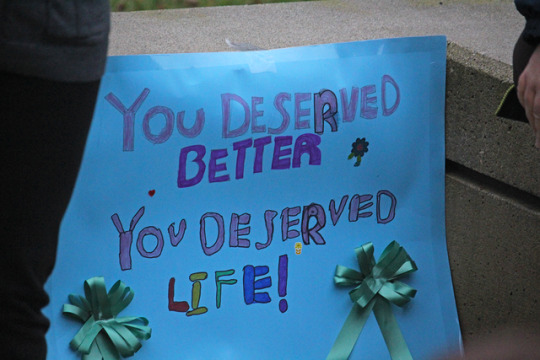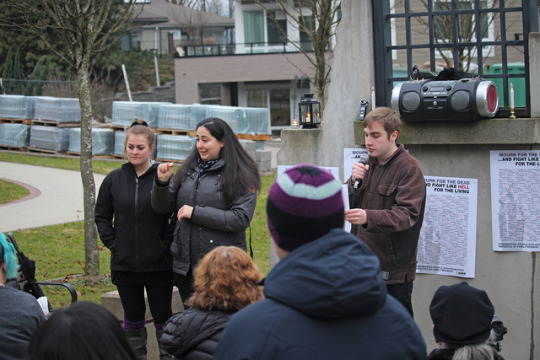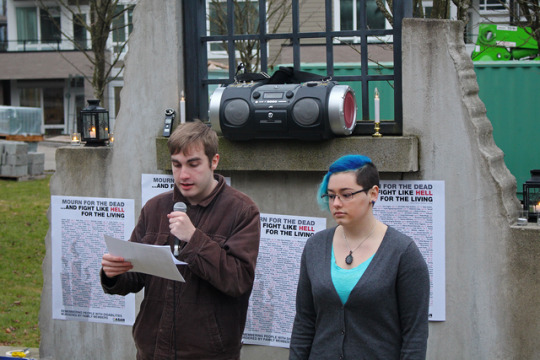#ddom2017
Text
ASAN Vancouver’s 2017 Disability Day of Mourning Vigil Address

[Image: A single candle. Its golden flame illuminates the total dark.]
Hello, friends and allies. My name is Amythest. I am autistic, and I am disabled.
We live in a world where, wrongly, some lives are considered to be worth less than others.
Where disability is so synonymous with tragedy that people say and mean things like, “If I became paralyzed I would kill myself,” or,
“I don’t think life would be worth living if I couldn’t see,” or,
"If you know your baby is going to be disabled, the only humane thing to do is make sure they aren’t born in the first place."
We live in a world where wheelchair users are approached and told that they are inspirations, simply for being outside of their homes or attending to their jobs or grocery shopping like everyone else.
Where visibly disabled people are openly told, “I don’t know how you do it, I would not be able to do it." As if our lives are so bleak that the average abled person cannot fathom why we have not yet committed suicide.
We live in a world where disabled people with cognitive and developmental disabilities are spoken down to, patronized, and treated like children — or worse. Regarded as incapable of thought or motivation, denied even the opportunity to try to communicate.
Where disabled people are institutionalized, segregated, stripped of our autonomy and right to choose for ourselves. Where disabled children and adults alike are abused and traumatized, all in the name of “treatment”.
Where disabled people are routinely denied equal opportunities for education and employment, medical care and organ transplants, the right to adopt or to raise their own biological children, the right to autonomy and self-direction, and equal protection under the law.
This is ableism. It is a most insidious enemy. In our society its reach is all-encompassing. Our medical establishments, our educational systems, every department of our government- all of it is informed by prejudice against and ignorance regarding people with disabilities. The pillars of our country have been built on a foundation of ableism.
Ableism is present in our sociological framework and in the day-to-day beliefs, values, and actions of the average Canadian citizen. And it must be questioned, countered, and smashed at every opportunity.
While an abstract idea to the abled majority, to the disabled community, ableism is a very real oppression. It is something we know intimately and something we struggle against every day. And it is this culture of ableism— this pervasive, ongoing devaluing of disabled lives— that has led us to this point.
In the past five years, over four hundred people with disabilities have been murdered by their parents or caregivers. Those are just the ones that we know about. In North America alone, almost eighty lives have been lost to the violence of ableism.
These are not isolated incidents, separate and unconnected. The truth is that there is a deep, ingrained prejudice in our society that asserts that a disabled life is not worth living. The worst lie of all is that to be disabled is to be worse than dead.
And so when one of our own is murdered, little attention is given to the victim of these horrific crimes. Media coverage and public discourse surrounding these killings overwhelmingly supports and even defends the actions of the murderer, calling these killings “understandable”, “inevitable”, or even, “merciful”.
The murders of three disabled Canadians were publicly reported in 2016. Cynara Ali. Melissa Couture. Ronald McCabe.
Cynara Ali's death was not understandable. Her mother, Cindy, killed her by suffocation, and then lied and claimed that a stranger killed Cynara during a home invasion.
Melissa Couture's death was not inevitable. She was developmentally disabled, like me. She was chronically ill, like me. She needed care and medical attention. Her mother, Patricia, killed her through neglect.
Ronald McCade's death was not merciful. Despite what the erasure of his obituary would have you believe, he did not "pass away after a long illness". His son, Adam, took a gun to the long-term care home where Ronald lived and killed him.
The most utilized quotation in all of the articles I read about Melissa's death came from a neighbour of 30 years. Of Melissa's mother, he said,
"Pat spent her whole life taking care of Melissa," and,
"You know when you get so exhausted from looking after somebody like that for so long, maybe something happened," and,
"I don’t know a more dedicated mother than Pat was to Melissa."
Of Melissa, he said much less.
" ... but Melissa was just, she couldn’t speak, she couldn’t hear, she was mentally challenged."
And that was it. This person was the Couture's neighbour for thirty years, which means that he knew Melissa for most of her short life. Of Melissa, the person who was killed by neglect, we know of this one sentence fragment.
And that sentence fragment speaks nothing of the loss of her life, or of her as a person. He highlights Melissa's impairments. He makes her out to be a burden. He rationalizes. He quietly condones the murder, blaming Melissa for her own death.
This is vastly different from the reaction when a non-disabled person is murdered by their parent. The media's tactic of focusing on everyone but the disabled victim is irresponsible journalism. This kind of reporting stokes the flames of prejudice and it is disabled people that get burned.
Further demonstrating how these murders are sanctioned by society is the fact that parents who murder their disabled children are much less likely to be charged at all.
If they are charged, their sentences are consistently shorter or less severe than the sentences received by parents who murder their non-disabled children. Some never see any jail time at all. This directly leads to more murders of disabled people.
This is the greatest injustice. This is where the devaluing of disabled life has brought us. Because our society’s understanding of what it means to be disabled is informed by the prejudiced opinions of the abled majority, it is easy.
It is easy to objectify and dehumanize disabled lives. And we become exactly that—objects of pity, burdens on our families, less than human.
If we want to stop this horrifying trend, we must resist. We must educate. And non-disabled people must listen to us. It is critical that society shift towards a person-centred view and understanding of disability. Listening to disabled people is the only way to do that.
Because if people would stop, and they would listen to us, they would hear what we are saying.
That our lives are worth living. That our lives are valuable. That we want to live.
They would hear our voices saying, see our hands signing, feel our hearts aching for justice.
And my hope is that then, our society would stop seeing us as a collection of impairments. That they wouldn't think of us as scary statistics, as a disease or epidemic, or as shameful deviations from the norm. That everyone could see us as individuals, wholly human and deserving of the same rights and personhood as everyone else.
And there is hope.
Patricia Couture was originally charged with failure to provide the necessaries of life for Melissa, which carries a maximum sentence of five years in prison. Her charge was upgraded to criminal negligence causing death.
Cindy Ali was charged with the first-degree murder of Cynara and sentenced to life in prison with no chance of parole for 25 years.
Adam McCabe was only charged with second-degree murder, which is defined as a murder that was not premeditated. I do not know how one could prepare a weapon, get in a vehicle, and drive to your father's secure long-term care home to kill him without meditating on it beforehand. There is much I don’t understand.
But there is hope. Hope for those still here and for those yet to come. And for those who have been taken from us: We will remember you. We won't let you be forgotten.
It is ignorance that leads to fear and hate. It is education that is the cure for ignorance. As an autistic person, that’s the only cure I want. It is my greatest desire that the disabled community and our allies can move the conversation away from negativity, hate, and fear, and towards acceptance, love, and equality.
It is my dream, and the dream of so many other disabled advocates and activists, that one day we will live in a world where disabled lives are understood to be worth just as much as non-disabled lives, and that reality will reflect that understanding.
I believe in a world where the murder of disabled people is seen as injustice, not our lives. Where our loss is the tragedy, not our presence. Our work is creating this reality.
I believe in a world in which disabled people are leading the conversation about disability, and in which abled people are listening and our allies are lifting us up. We have already come so far.
I believe that we can make a safer, fairer world for the next generation of disabled children because I can see what we have accomplished. We just have to keep going.
And I know that if the disabled community keeps faith and works together, we can amplify our voices and drown out the lies. That even in the face of such adversity, such violence, such hate, together we can make the whole world hear what we have to say.
There is hope.
Thank you.
#ddom#ddom2017#disability day of mourning#disability#ableism#violent ableism#filicide#murder#suicide#child death#gun violence#knife violence#medical abuse#neglect#general huge trigger warning#gun tw#knife tw#text heavy#mywriting
295 notes
·
View notes
Link
Autostraddle had a #DDoM2017 roundtable featuring the voices of a number of powerful disabled voices
25 notes
·
View notes
Link
12 notes
·
View notes
Text
Tomorrow the disability community will gather across the nation to remember disabled victims of filicide http://owl.li/c0vf309l0V9
ASAN Vancouver’s vigil will be held at Woodlands Memorial Garden at 5 pm.
RSVP on Facebook or Meetup:
https://www.facebook.com/events/245045489274815/
https://www.meetup.com/asan-van/events/237357868/
#ddom2017#asan#asan vancouver#actuallydisabled#actuallyautistic#disability day of mourning#events#filicide#vancouver
47 notes
·
View notes
Photo



Working the virtual Vigil for Disability Day of Mourning today. Had a chance to grab a picture of myself wearing black while the folks were out to remember and mourn the lives of those that were taken from this world due to filicide. #DDoM2017
13 notes
·
View notes
Photo

A photo of me and my puppy observing the Disabled day of Mourning. We've lost 100 people that we know of to filicide and caregiver murder in the last year, there are almost certainly more cases. Please don't forget that ableism is real, and it has a huge body count. Not only these people, but up to half of police killings are against us, specifically and especially those of us who are people of color, queer, or both. But by a large margin our deaths are ignored, justified, or excused. No more. Our lives matter, our deaths should be mourned. Don't forget us.
1 note
·
View note
Link
When and Where:
Wednesday, March 1 from 7 PM - 9 PM
St. Patrick's Episcopal Church in Dunwoody, GA
4755 N Peachtree Rd, Atlanta, Georgia 30338
What:
This is the Atlanta Disability Day of Mourning vigil.
“Every year on March 1st, the disability community gathers across the nation to remember disabled victims of filicide–disabled people murdered by their family members or caregivers... we ask you to join us.”
For more information:
For information about the Atlanta vigil, email the ASAN Atlanta chapter leader at [email protected].
If you want to learn more about the vigils and see locations, click here. The direct sign-up link to host a vigil is here. A site coordinator’s guidebook [PDF] is at this link.
5 notes
·
View notes
Photo









[Images: Nine photos from ASAN Vancouver’s Disability Day of Mourning vigil on March 1, 2017. The vigil took place at Woodlands Memorial Garden, in a courtyard in front of a sculpture called Window Too High. The sculpture features a concrete wall set with a barred window original to Woodlands School, an institution for developmentally disabled people that used to stand where the park is now.
A crowd of 25-30 people of varying ages and races can be seen gathered in the small courtyard around an empty, rectangular reflecting pool in the centre. Most are dressed warmly in black or dark colours. The weather is cold and overcast.
There are two decorative lanterns with candles inside and some candles in glass votives set on either side of the barred window sculpture. Four posters printed with the names and ages of hundreds of disabled people who were murdered by family or caregivers hang on the concrete wall. The header on each poster reads, “Mourn for the dead... and fight like hell for the living”.
In the first photo, co-chapter leader Sam McCulligh stands in front of Window Too High and leads the opening of the vigil while the crowd looks on. The second image is a close-up of Sam’s face as he addresses the crowd through a handheld microphone.
The third and fourth photos are shots of the attendees gathered around the empty reflecting pool, listening and watching quietly.
In the fifth image, chapter member Jade assists with the reading of the list of the names of the dead through the microphone. Their hair is a striking blue that matches their turquoise shirt and ring.
In the sixth image, an attendee sits and listens. He is holding a glowing LED candle in his hand, and a camera recording the vigil is visible in the shot.
The seventh photo is a close-up of one of the posters made by chapter members for the vigil. The poster is made of blue paper and is decorated with ribbons and stickers. Colourful letters read, “You deserved better, You deserved life!”
The eighth photo looks over the heads of the crowd at Sam, who is speaking on the history of Woodlands Institution, and of two ASL interpreters as they interpret Sam’s words.
In the ninth photo, Sam and Jade stand in front of Window Too High and read the names of the dead from a long paper list together. End image description.]
#ddom2017#ddom#disability day of mourning#asan vanvouver#vigil#activism#photos#photo heavy#image described#disability rights#social justice#filicide#murder#child death#violence
133 notes
·
View notes
Link
The lives of people with disabilities are worthwhile, and it is our deaths — not our lives — that are the tragedy
24 notes
·
View notes
Link
15 notes
·
View notes
Text
TODAY is #DDoM2017. Make sure you join us as we honor our dead- find a local vigil at http://owl.li/itK7309l0CA Can't make your local vigil? No local vigil? The virtual #ddom2017 vigil starts at 3pm est! http://owl.li/PJxd309lcGg Metro Vancouver's vigil will be held at Woodlands Memorial Garden in New Westminster today at 5 pm.
#ddom2017#asan vancouver#events#disability day of mourning#disability rights#actuallydisabled#filicide#murder
1 note
·
View note
Link
Syracuse University community members held a vigil as part of the international Disability Day of Mourning
18 notes
·
View notes